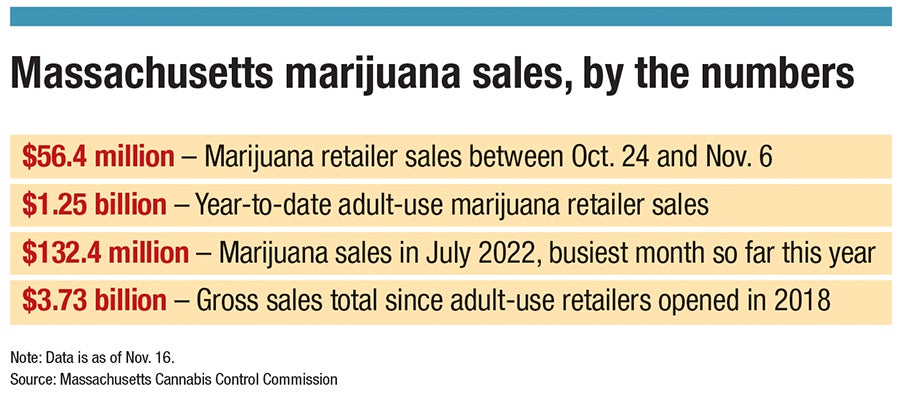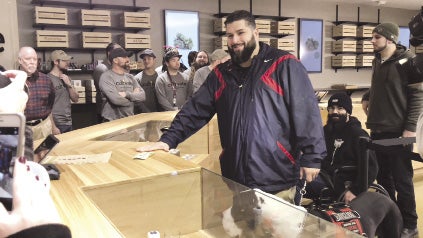By purchasing well-established marijuana stores, Sean “Diddy” Combs is buying into already profitable establishments with a proven track record. His investment creates the first minority-owned, vertically-integrated multi-state cannabis operator in America.
Get Instant Access to This Article
Subscribe to Worcester Business Journal and get immediate access to all of our subscriber-only content and much more.
- Critical Central Massachusetts business news updated daily.
- Immediate access to all subscriber-only content on our website.
- Bi-weekly print or digital editions of our award-winning publication.
- Special bonus issues like the WBJ Book of Lists.
- Exclusive ticket prize draws for our in-person events.
Click here to purchase a paywall bypass link for this article.
With his purchase of four established Massachusetts marijuana locations, rapper, producer and mega entertainment mogul Sean “Diddy” Combs entered the state’s growing market without having to go through the arduous process coming with opening a new facility.
Earlier in November, Combs picked up cannabis establishments in Worcester, Leicester, and Greenfield – including one of the first two dispensaries east of the Mississippi River – in a $185-million transaction that also included pot businesses in New York and Illinois. Combs’ purchase came as a result of an acquisition of Columbia Care of New York City by Chicago-based multistate operator Cresco Labs, which required both companies to divest some of their assets.
By purchasing well-established stores, Combs is buying into already profitable establishments with a proven track record. His investment creates the first minority-owned, vertically-integrated multi-state cannabis operator in America.
“If you can pick your stores that have already proven to be successful, maybe you pay a premium, but at least they’re in the market,” said Robert Munnelly, shareholder and cannabis attorney at Davis Malm law firm in Boston. “You get to come on in and expand the company from there.”
Massachusetts cannabis regulations place restrictions on how many licenses a holder can own, in an effort to level the playing field. Still, inequalities remain in the young but lucrative industry.

Legal requirements for the pot delivery-only business, which at this point is only open to entrepreneurs adversely impacted by the War on Drugs, mean those businesses are often run in the red. Big-money players that existed in the preceding medical market had all the advantages of being established before law approving recreational use had even passed. And because of the cost to open, many entrepreneurs put their fate in the hands of deep-pocket investors, who often want a larger piece of the pie.
“Essentially what happens is you're going to have those big vertical multi-state operators prepared for recreational, and then they’re going to have to institute an equity bill with a foundation built on billion-dollar corporations with dispensaries,” said Ulysses Youngblood, founder and president of Worcester cannabis business Major Bloom. “How do you compete with that?”
Regulatory environment
Before voters approved adult-use cannabis in the 2016 Massachusetts election, state officials, including Gov. Charlie Baker and now Governor-elect Maura Healey, advocated against legalization. So when the majority of state voters said “yes” for adult-use, a strict regulatory environment with multiple stages of approval was created, Munnelly said. Creating an industry that involved a lot of approvals but also rectified some of the wounds of the War on Drugs was a priority, he said.
“They decided, ‘Okay, we’re going to do our duty and have an industry, but make sure it’s safe and fair to consumers,’” he said.

Under state law, license holders can control no more than three licenses in a particular category. Simply put, that means three retail stores, three cultivation licenses, three product manufacturing licenses, et cetera, with a few exceptions for things like microbusinesses. That’s why Columbia Care and Cresco Labs had to drop some assets when they merged.
“They do not want a limited number of people exercising control over lots of Massachusetts licenses,” Munnelly said. “They wanted a diverse cannabis business, where no one can really exercise complete market power.”
But to create a new equitable industry out of a smaller, more exclusive medical market, was flawed from the start, Youngblood said.
Major Bloom sells marijuana out of its Worcester retail store, but it also manufactures products and sells to about 40 dispensaries across the state. The company does home delivery, at least to cities that allow it, he said. After self-funding the business for many years, and weathering several storms like local governments that turned up their noses at the sheer concept of allowing weed within their borders, Youngblood said he fundraised through friends and family, ultimately crowdsourcing $1.3 million.

But his situation, he said, is rare. Other entrepreneurs have to take money from investors, which can put them in the difficult spot of having to give up at least some control.
“A lot of people in the space, they just kind of network with high-wealth individuals. A lot of people are in a position to give up equity in business. For the most part, it’s a lot of private deals,” he said.
Legally speaking, an individual isn’t allowed to own or control more than three pot licenses of any type, Munnelly said. That means that even if someone doesn’t outright own a pot business, if they’re a decision maker with respect to operations or activities, they are deemed by the Massachusetts regulatory body Cannabis Control Commission as someone with a stake in the licensing.
“When you have any type of change or control has to be approved by CCC, you have to file an application for it. On all the licenses you own or control, who's the management team? They have to do a detailed analysis to figure out what the ownership implications are,” he said.
Funding reform
The new cannabis reform bill signed into law over the summer created a pool of money specifically for disenfranchised business owners. But as things currently stand, a lot of barriers still exist.
It looks good on paper to reserve the pot delivery-only business just for equity entrepreneurs, Youngblood said. But the reality is, many towns and cities don’t want pot delivery, which keeps out huge slices of potential profit; and certain regulations, like the one that requires two delivery people to be in the car, prevent businesses from making a profit, he said.
“Two drivers in a car doubles the cost. They say it's a safety risk if there's less than one person in a car, but I have iPhones, Jordans, and earbuds that cost more than the weed we’re delivering. It doesn't make sense,” he said.

Even with the existing obstacles, however, there’s still a lot of interest in cannabis entrepreneurship.
Holyoke Community College’s Cannabis Education Center offers several educational tracks for the cannabis industry, including cultivation, culinary skills, extraction and infusion, and customer service. The college is in the process of developing an entrepreneurial track because of high interest from the surrounding area.
“The hope was some of the training would enable people, who were arrested or charged with crimes, [to have] opportunity to get into this industry, and not be held back because of their record for use of marijuana,” said Jeffrey Hayden, vice president of business and community services at the college’s Kittredge Center for Business and Workforce Development. “On the entrepreneur side of that, people might think ‘Here's a chance for me to start something I'm passionate about.’”
There’s still a lot of room for new kinds of businesses in the industry, too. The new law paved the way for a cannabis cafe pilot program, essentially creating the pot equivalent of bars. For Holyoke, the pot industry has created important opportunities, Hayden said.
“I’m a 63-year-old white male who didn't think training in cannabis would be something I'd be promoting, but frankly the fact that it’s an opportunity for people in our community who have lacked access to employment, I’m all for it,” he said. “It’s not that I'm going in to buy it; it’s just an opportunity for people to get a job, to get a better job, or learn how to do their job better, and that's really important to me.”

